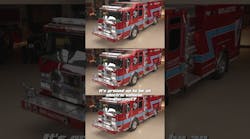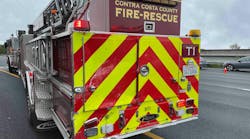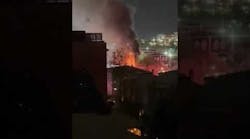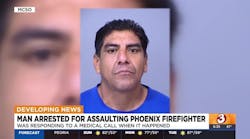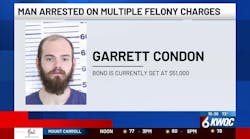Feb. 23--Chick Carter didn't have any thought of being a pioneer back in 1951.
He didn't even want to be a firefighter.
But a friend urged him to come along one day and stand in the long line of people applying to be the first black firefighters in Winston-Salem. That friend, John Ford, saw someone he knew up at the front of the line and walked up. He motioned for Carter to join him. A conversation turned into a chance to jump the long line.
And Carter found himself a member of an eight-man recruiting class that turned into the first racially integrated fire company.
Carter and the other three living members of Engine Four were honored Friday in a black history program taking place at the Goodwill Industries headquarters on University Parkway.
Carter, Raphael O. Black, Robert L. Grier and John Roi Thomas all sat in the front row as Winston-Salem Mayor Allen Joines and others talked about their achievements and those of other blacks who have pioneered roles in the department.
Among those were the black fire chiefs who have led the department: Lester Ervin, chief from 1980 to 1989; Otis Cooper, chief from 1993 to 1998; John W. Gist, chief from 1998 to 2008; and Antony Farmer, the current chief.
After the ceremony, Carter told how he was at loose ends when he decided to try out being a fireman. He had dropped out of Winston-Salem Teachers College, as it was known then, to play baseball, where he picked up the nickname Chick (his real name is Willie J. Carter). When Carter discovered he was not going to get into the Majors he knew he had to make other plans. He told his wife he would try being a firefighter for six months, then go back to college.
"I stayed 35 years," Carter said.
It wasn't easy being a black firefighter back in the 1950s. Chief M.G. Brown was against having the black firefighters in the department, Carter said, and tried to make life hard.
"When we had our training, he didn't even give us fire gear to train in," Carter said. "We were training in civilian clothes." Carter said black firefighters got "the most distasteful assignments" and weren't rotated out for rest breaks, as the other men were, when they were on the scene of a big fire.
But don't get the impression that the retired firefighters are nursing grudges. They tell their tales like a veteran tells war stories.
"They sent us on the worst fires," Thomas said. "They did it to discourage us, but we just laughed and went on."
Quietly, almost secretly, the black and white firefighters ended the petty segregation at the Engine Four firehouse.
Engine Four consisted of the eight black firefighters and seven white officers who had volunteered for duty there.
At first the segregation was what you'd expect in the 1950s in the South: Separate water fountains, bathrooms, meals and so on.
Thomas said one white officer decided it didn't make sense. Why couldn't they all just use the same facilities and eat together, since they were all there at the firehouse? So that's what they did, long before the era of sit-ins and demonstrations. The chief didn't like it, Thomas said, but ended up having to tolerate it.
One of the eight black firefighters, Lester Ervin, became fire chief in Winston-Salem in 1980 and retired in 1989 with 38 years of service. Ervin died in 1998. His granddaughter, Taelor Dickenson, was there to accept recognition on his behalf during the ceremony.
"I look at us as trailblazers," Thomas said. "If we had failed we would have set a bad example."
(336) 727-7369
Copyright 2013 - Winston-Salem Journal, N.C.
